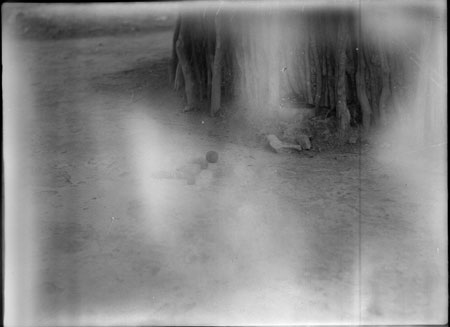Bongo rain stones

103 x 75 mm | Negative film nitrate
There are records relating to alternative images that we do not have scans for in the database:
1998.343.46.2 - Print gelatin silver , (103 x 75 mm)
1998.343.46.2 - Print gelatin silver , (103 x 75 mm)
Date of Print:
Unknown
Previous PRM Number:
EP.B.49
Previous Other Number:
29 [frame 10]
Accession Number:
1998.343.45
Description:
A set of old stone axe-heads and other stone tools, laid out on the ground by Surur the rain-maker for Evans-Pritchard to photograph them (although not touch them) from their home along with his hair clippings in a pot beneath the eaves of his stake-walled hut.
These stones were called landa loma - stones of Loma, a spiritual connection with rain-making.
During rain-making Surur would place these stones along with magical medicines in a pot with rock-pool water and sprinkle to the east where the next day was to arrive from [light leakage on negative?].
Photographer:
Edward Evan Evans-Pritchard
Date of Photo:
1929 March
Region:
[Southern Sudan] Warab Tonj
Group:
Bongo
NamedPerson:
Surur
PRM Source:
Edward Evan Evans-Pritchard
Acquired:
Donated 1966
Other Owners:
E. E. Evans-Pritchard Collection
Class:
Ritual , Ritual Object , ?Tool , Shelter
Keyword:
Vessel , Building House
Primary Documentation:
PRM Accession Records - Accession Book Entry [p.
98] 1966.27 [1 - 24] G[ift] PROFESSOR E.
E.
EVANS-PRITCHARD; INST.
OF SOCIAL ANTHROPOLOGY, 51 BANBURY RD.
OXFORD - 1966.27.19 - S.
SUDAN, DARFUNG.
VARIOUS TRIBES.
Box of negatives in envelopes, [1 - 242] & 1966.27.20 - Box of prints of these negatives [refers to object 1966.27.19] [1 - 242], in envelopes.
Other Information:
E.
E.
Evans-Pritchard discusses his encounter with Surur the rain-maker in some detail on pages 21-27 of In "The Bongo" (Sudan Notes and Records Vol.XII Part I 1929).
In particular on page 23-24 he notes that 'As it was near sunset and I wanted to take some photographs, I asked Surur if he would let me see his rain-stones and tell me about his medicines in situ...
he took me to see them on condition that I did not touch them, which I promised not to do.
They were lying in an old pot (or possibly sherd) which appeared to be let partly into the earth under the verandah of his hut...he was kind enough to take them out and lay them on the ground so that I could see them.
He also permitted me to photograph them, but since he would not allow me to finger them, it was difficult to estimate their qualities well, especially as they were thick with dirt and age.' [Chris Morton 20/1/2004]
Recorder:
Christopher Morton 20/1/2004 [Southern Sudan Project]

